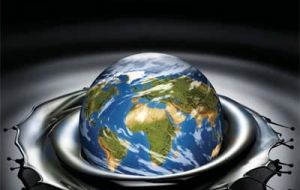MercoPress. South Atlantic News Agency
Low inventories push crude to 71 USD, highest in seven months
 Oil production in 2008 increased boosted by OPEC; non OPEC output was down 1.4%.
Oil production in 2008 increased boosted by OPEC; non OPEC output was down 1.4%. Crude prices continued to surge on Wednesday, rallying on the news that US inventories fell more than expected and Chevron confirmed a fire at its Nigerian oil facility. Light, sweet crude for July delivery jumped 1.32 dollars, 1.9%, to settle at 71.33 dollars a barrel on the New York Mercantile Exchange, the highest close in seven months.
According to the U.S. Energy Department's Energy Information Administration (EIA), crude stockpiles dropped by 4.4 million barrels for the week ended June 5 while gasoline inventories dropped by 1.6 million barrels. However, the market had broadly expected a drop of 4 million barrels in crude and a slight build in gasoline.
Meanwhile, US oil company Chevron confirmed a fire at its Utonana production facility in southern Nigeria on Wednesday, spurring more concerns on supply side. In London, Brent crude for July delivery rose 1.11 dollars to 70.73 dollars a barrel on the ICE Futures exchange.
In related news BP Plc reported that the world proved oil reserves fell in 2008, the first drop in a decade. Proved reserves of 1.258 trillion barrels in 2008 were 3 billion barrels less than in 2007, the company said.
Energy consumption by members of the advanced economies — Organization for Economic Cooperation and Development, OECD— fell behind consumption by all other nations including China for the first time, BP said in its Statistical Review of World Energy.
“In 2008 the world was no longer supply-constrained, as production growth exceeded that of consumption for all fossil fuels, particularly later in the year,” Tony Hayward, BP's group chief executive, said in an introduction to the report.
“Our data confirms that the world has enough proved reserves of oil, natural gas and coal to meet the world's needs for decades to come,” Hayward added. “The challenges the world faces in growing supplies to meet future demand are not below ground, they are above ground. They are human, not geological.”
BP said increases in proved oil reserves in Vietnam, India and Egypt were offset by falls in Russia, Norway and China.
The company said in its annual global energy report that the proved reserves figure for 2007 had been revised upward by 23.1 billion barrels. Middle Eastern producers accounted for 59.9% of global reserves, led by Saudi Arabia with 21%.
Global oil production increased by 0.4% in 2008 on the strength of a 2.7% boost in output from OPEC countries, the report said. Non-OPEC production fell by 1.4%, the biggest drop since 1992.
Saudi Arabia increased production by 400,000 barrels per day and Iraq by 280,000 bpd, BP said. Mexico had the largest decrease at 310,000 bpd; Russian output fell by 90,000 bpd, the first decline in 10 years.
Global consumption of coal rose by a below-average 3.1%, but coal was the fastest-growing fuel for the sixth year in a row, the report said. China's consumption rose by 6.8% accounting for 85 percent of global growth.
Nuclear output fell by 0.7%, hit by a 10% drop in Japanese nuclear production resulting from an earthquake in 2007. Global hydroelectric generation grew by 2.8%, with China setting the pace with a 20.3% increase.
The report also refers to solar energy capacity which rose by 69% and wind power capacity which jumped 30%. US passed Germany as the wind energy leader for the first time, with a 49.5% increase in 2008.




Top Comments
Disclaimer & comment rulesCommenting for this story is now closed.
If you have a Facebook account, become a fan and comment on our Facebook Page!